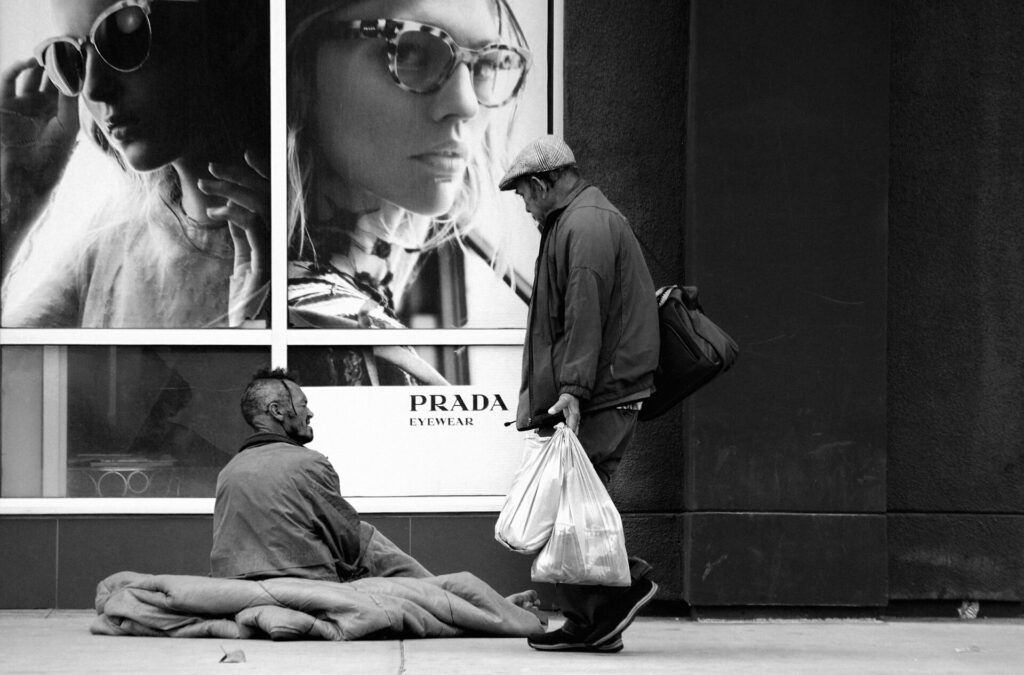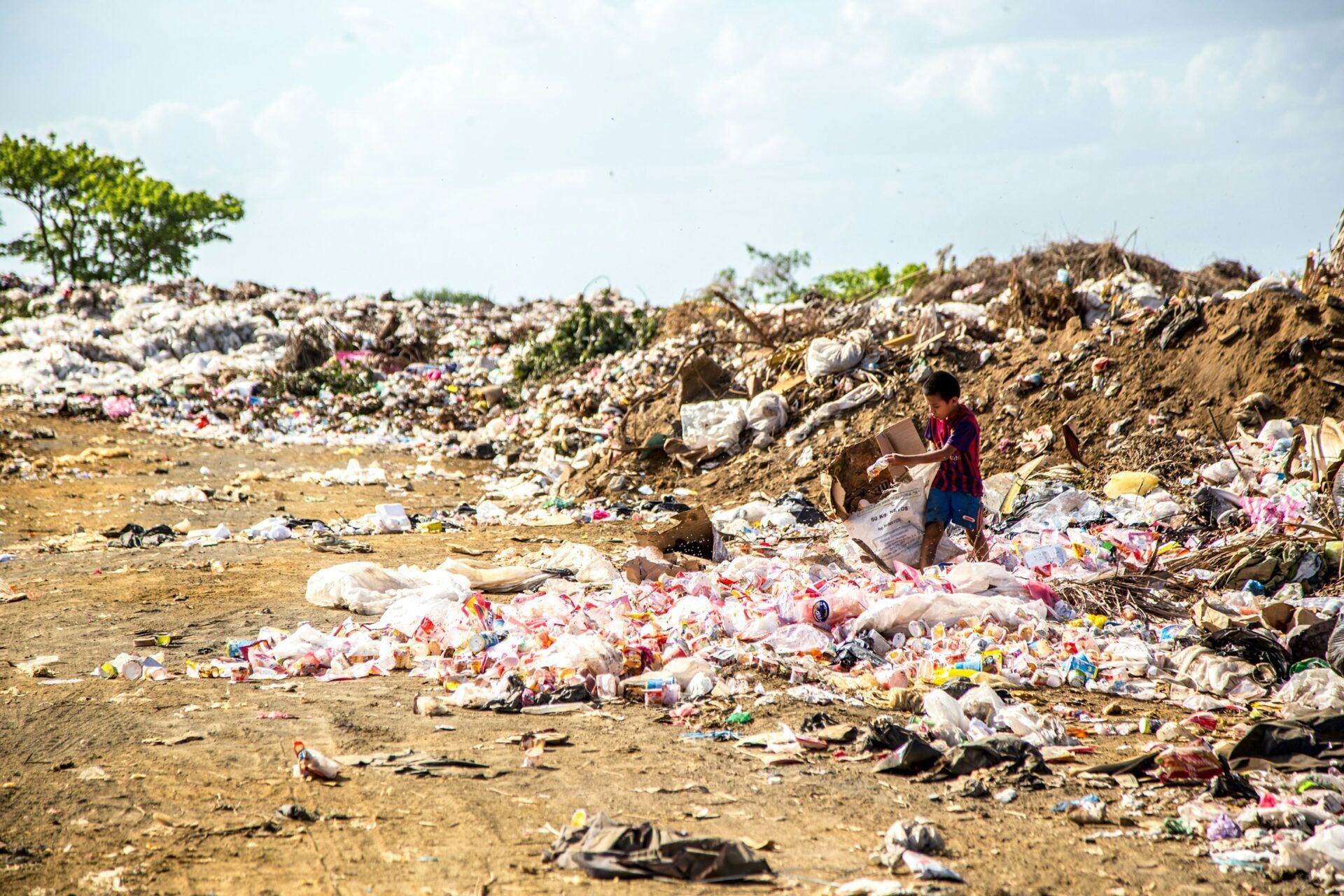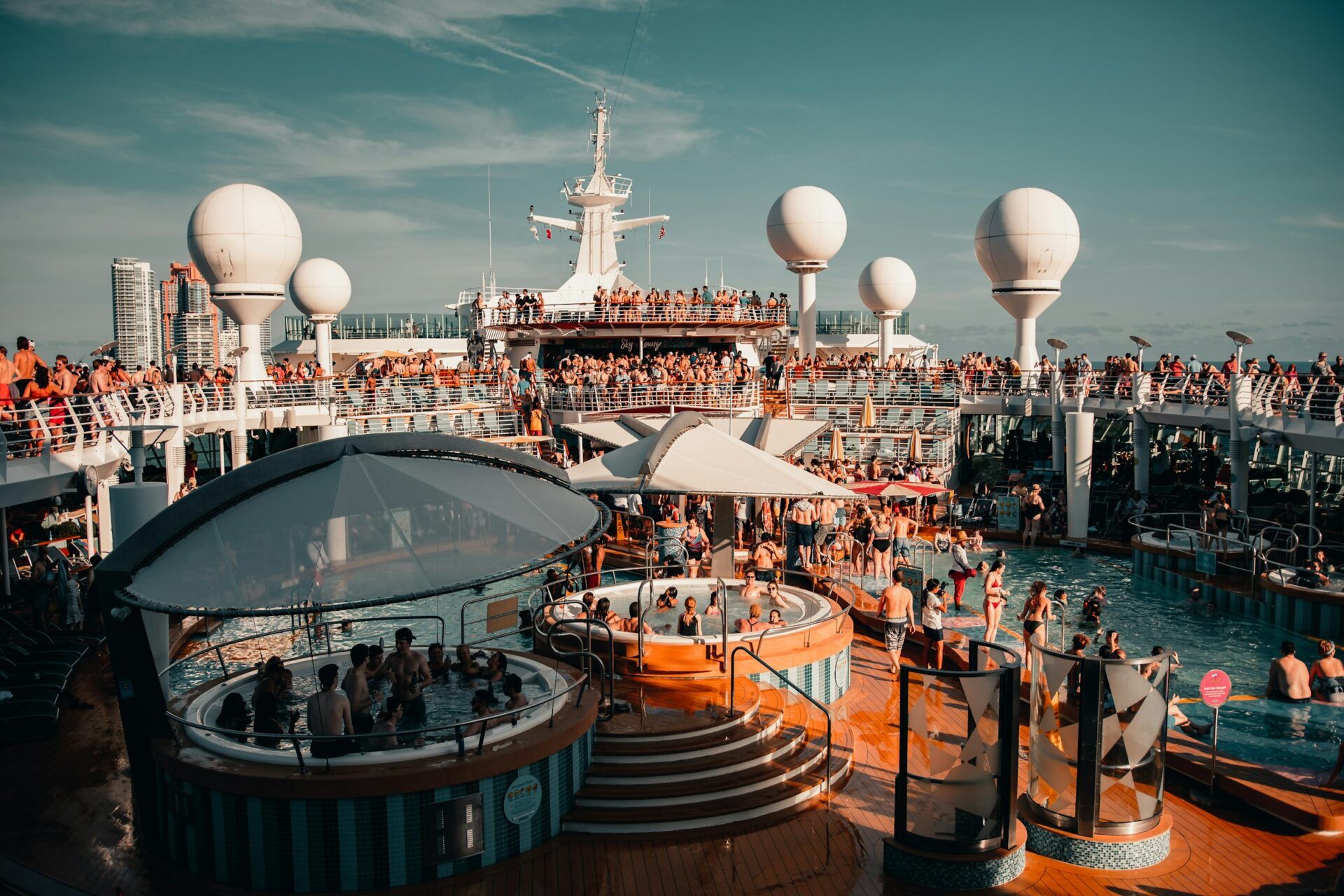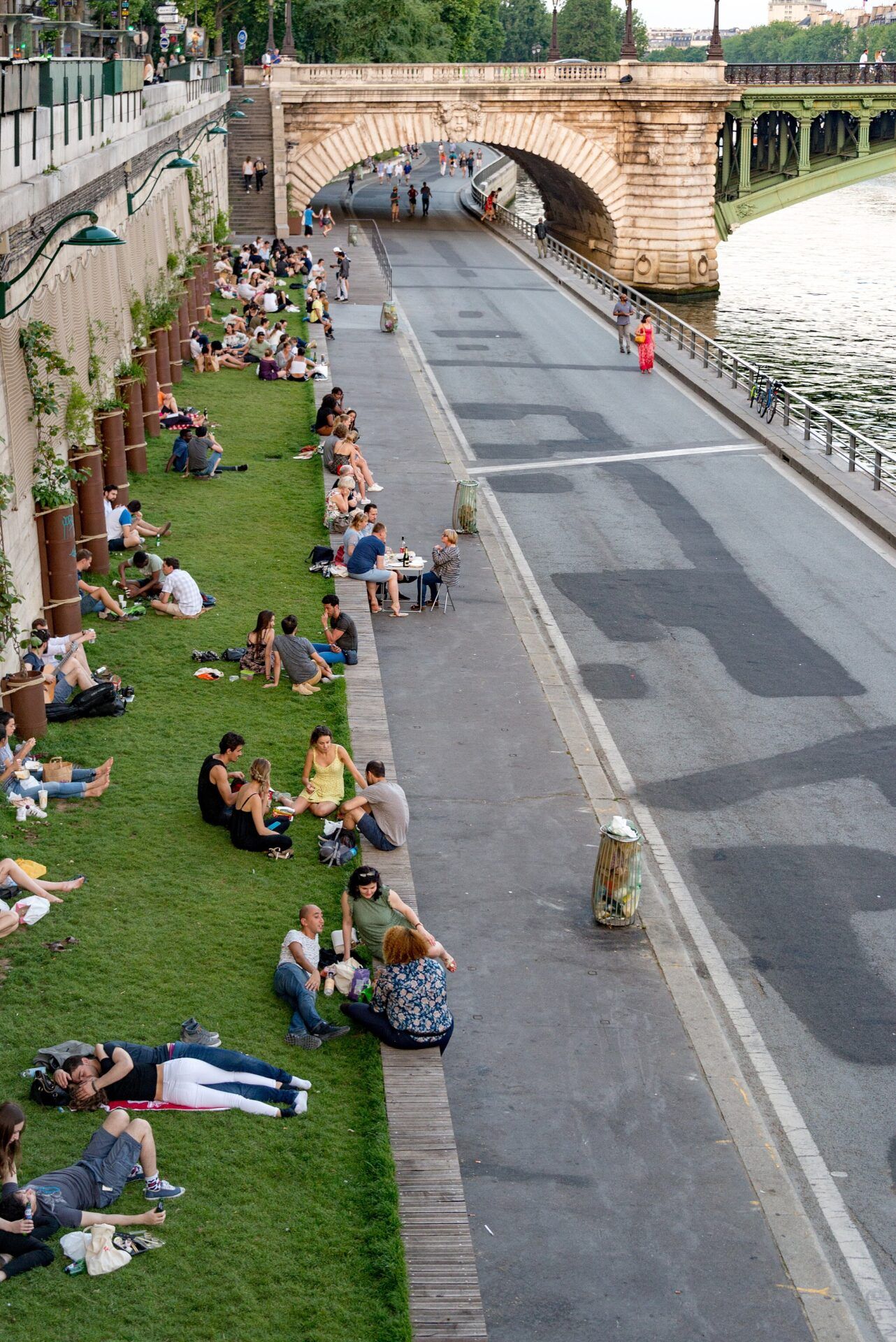Inequality is a climate problem
By Jessica McKenzie | February 5, 2024
 Photo by Max Böhme on Unsplash
Photo by Max Böhme on Unsplash
There is a broad consensus that the impacts of climate change are not experienced equally. According to the World Bank, “The poorest and most vulnerable people bear the brunt of climate change impacts yet contribute the least to the crisis.” Versions of this sentence are practically boilerplate in many articles about the climate crisis.
Moreover, there is a growing body of evidence that climate change is increasing inequality, within and between countries.
In spite of this, there is still a disconnect in government policies aimed at addressing inequality or carbon emissions. One is rarely taken into consideration when enacting policies to address the other.
In a recent article in Nature Climate Change, Charlotte Kukowski, a postdoctoral research associate at the Cambridge Social Decision-Making Lab, and Emma Garnett, a researcher at Oxford’s Sustainable Healthy Food Group, argue that tackling inequality is essential to addressing climate change through behavioral changes.
They highlight numerous ways in which lower-income individuals are disadvantaged when it comes to choosing low-carbon alternatives. Public transportation networks are more robust in wealthier urban centers than in poorer rural or suburban areas. Within cities, bike-share systems are often introduced to wealthier, whiter neighborhoods first. And as anyone who has ever looked into a cross-country Amtrak trip will know, flying is often (much) cheaper than taking the train. Even assuming someone lives in a place where train travel is more affordable, it can require a greater time commitment.
Of course, the flip side of this conversation is that the wealthiest individuals—and the wealthiest countries—are responsible for more carbon emissions. Kukowski and Garnett suggest several ways to address these imbalances, including “progressive taxation on wealth and income;” carbon taxes on aviation fuel, red meat, and large homes; and scaling the cost of parking permits or congestion fees for heavier, more expensive, and more polluting vehicles.
In the following interview, Garnett, Kukowski, and I discuss what prompted them to write this article, the changes they hope it will bring about, and what additional research needs to be done in this area. Garnett and Kukowski also explain why reprioritizing time, community, and well-being over consumerism and the “tyranny of things” is vital for making the big, societal shifts necessary to address climate change.
Editor’s note: This interview has been condensed and edited for brevity and clarity.
Jessica McKenzie: Could you start by sharing a little bit about your areas of expertise and your research and how you came to write this commentary?
Charlotte Kukowski: My training is originally in psychology, so I study how people make decisions and the role of behavior change in the climate crisis. And I’ve found that actually, psychology and other disciplines that study behavior are really great at looking at individuals’ motivations, attitudes, knowledge, and what we can do on the individual level. But I found that there can be a bit of blindness regarding more structural barriers to behavior and a sort of a refusal to acknowledge that.
My work now looks at behaviors and specifically high-impact behaviors in terms of carbon, so: diets, flying, and transportation behaviors, as well as more citizen-level behaviors like voting, and often in the context of inequality.
Emma Garnett: My background is in ecology and biodiversity conservation. So, while I still feel like an ecologist and love birdwatching, I took a shift towards the social sciences during my PhD, which was about what strategies work to get people to reduce meat consumption in cafeterias and University of Cambridge colleges were my study settings. And the motivation for that shift was essentially [the realization] that environmental problems are people problems. Pretty much any environmental problem you think about, people—and particularly the powerful and rich—have set up society in such a way that we’re not living within planetary boundaries.
As Charlotte said, behavior is important, but the context in which that happens is so vital. And I think a lot of researchers in this field get very frustrated with both ends of the argument: “We’ve all got to do our bit and recycle” is one end of the spectrum. Well, people have different [amounts of] time and agency and ability to do that. And then on the other end of the spectrum, “100 companies are responsible for nearly all of the pollution, I don’t have to do anything.” That’s not quite how it works out, either. What we’re trying to say in this piece is that the amount of privilege you have corresponds to how much responsibility you should take and that in a more equal society, we can redistribute agency and privilege such that we truly are all in this together. A lot of the commentary around climate change is, “This is going to affect everyone”—well, not equally, not in the same ways. Getting on a more level playing field is vital for so many different reasons.

I have been in so many workshops where people are talking about healthy and sustainable diets, and you’ll have a number of people, all very well-meaning, saying, “No one cooks anymore and everyone’s eating takeaways or unhealthy food.” And I think, yes, that’s true, but to eat healthily and sustainably takes either time or money. For example, buying a fresh ready-to-eat salad a) comes in a lot of plastic and b) costs a lot of money. And yes, you can make delicious, nutritious, sustainable meals from scratch. But that takes having a kitchen you’re able to use safely, and storage space, and the headspace to meal plan to avoid food waste.
[We have these] conversations about making sure low-income people get access to healthy and sustainable food, but how about making [the conversation about] reducing inequality? And that just seemed to be missing out of conversations. It was all about, how can we fish people out of the river, rather than why are so many people falling in?
These big structural levers—how much housing costs, how much free time people have… How does that fit into all of these different healthy behaviors, but also sustainable behaviors? It’s not that green behaviors are necessarily more time-consuming and more expensive. But making changes does take that bit of cognitive effort, and there needs to be widespread societal changes to decarbonize. So let’s give people the time and money and state support to be able to do that.
McKenzie: What’s the goal of a commentary like this? It’s in a scientific journal, but it’s more of an opinion piece. Are you trying to reach scientists, in the hope that they will start looking into this in more depth? Are you hoping it will make it to policymakers, either through interviews like this one or your piece in The Conversation?
Kukowski: I guess the very optimistic answer is some of all of that. So, as Emma and I both outlined a bit, we just had this frustration with how some of the conversations in academia and in our research were going. We’ve got all these people doing great work, competent work, on how to tackle these important problems. But we felt that we weren’t really talking about the fundamental roots of some of those problems. So why don’t we talk about that? And why don’t we sort of reroute some of those efforts to actually looking at what’s causing the problem? So that was one of the goals we had in reaching scientists.
But then also in the article itself, we outline some ways that these problems could be addressed by policymakers, by people who employ other people, who run companies, by people in city planning—practical areas where we feel those could be addressed.
Like Emma said, there’s a lot of inequality in climate change. And so that inequality exists in whom climate change affects, right. So that’s disproportionately the poor—poorer individuals, but also poorer countries—but also how climate change is caused and has historically been caused. So that’s by richer individuals, but also richer countries. Historically, North America and Europe have been responsible for half of the emissions combined. If you think about fair shares, who’s got what to do? Who’s got how much left? I think that’s really important to talk about, and that often gets left out. We wanted to draw attention to the different ways that inequality is an important lens to see this through.
McKenzie: I feel like when people talk about these issues, they are often considered separately in silos, like you have inequality here, and you have emissions and climate change and climate crisis here. And people think that they’re both sort of these intractable, human-created problems. And I feel like you’re sort of making the case that they’re neither intractable and that they should be considered together and they are more easily solvable that way.
Garnett: I love your phrase an intractable human problem. I think you’re right. That is how it’s viewed. But if it’s a human problem, then it is a tractable one. We can’t negotiate with carbon dioxide to be less of a greenhouse gas, whereas these human systems that we’re in and have created, are tractable and negotiable. I’m not saying that’s easy at all! But that it is possible, in a way that we can’t just rewrite the laws of physics to solve climate change.
Sometimes that feeds into relatively well-off people—not the one percent, but maybe [someone in the] top 10 percent, 20 percent in high-income countries—saying, ‘Well, you know, what’s the point of me doing X, Y, Z, when the super-rich are burning this much carbon?’ And I think that is a real challenge. In very unequal societies, even if you’re towards the top end, you can feel this real lack of agency [because] society is quite polarized, quite separated. That you’re not in this all together.
The Guardian had this fantastic article where they interviewed extremely rich yacht owners [about their carbon emissions from yachting]. And they said, “Oh, you shouldn’t go after individuals, you should go after the system.” And many of us can see that that’s a ridiculous excuse, because it’s easier to see and criticize people richer than you making excuses. But many of us in high-income countries are in the richest top 10 percent globally and we need to stop making excuses for ourselves.

In terms of who we hope this commentary reaches, obviously, the piece in Nature Climate Change is much more accessible to scientists, partly because it’s behind a paywall. And The Conversation [where we contributed a short blog post on this topic] is a fantastic platform for reaching that wider network.
[There is] huge inequality in who causes climate change, and we need lifestyle changes to tackle climate change. And there’s a little bit of a gulf in the middle, how those two intersect, but if you’re not acknowledging the huge amounts of inequality, you’re going to be running up against a brick wall in terms of lifestyle changes, because those won’t be fair, those won’t be within everyone’s reach. Whereas if you are thinking “we just have to tackle inequality and the one percent’s lifestyles to solve climate change, and nothing in my lifestyle needs to change,” then that [will also fall short] of the scale of transformation needed.
Kukowski: There can be this sort of false dichotomy, either between, “oh, it’s all on the individual,” versus “oh, it’s just the rich, or these companies.” And it’s really difficult to reconcile these.
We’ve got this huge problem. And it’s complicated and inequality makes it so much more difficult. But individual behavior change is not meaningless, because to get to where we need to get because, like Emma said, you can’t argue with physics, right?
McKenzie: I definitely do hear that individual behavior change is important. But in that box in the article where you highlight things individuals can do for systemic change, it’s like, lobby for this or that policy. If there’s not a specific thing on the ballot, it’s hard to feel like you can have much impact, as an individual.
Garnett: I think that what you’ve touched on is the extent to which we underestimate how much our built-in social environments affect the choices we make and the importance of policies. Free choice does not exist in a vacuum. And the current setup is not a neutral or inevitable one. And I think in terms of what you’re doing for the planet, if you drive a car, because you have to, but you are vocally supportive of policies to improve bus networks and improve safe cycling infrastructure, I would say you’re doing your bit for climate change far more than if you’re someone who doesn’t own a car, and cycles, but is lobbying against car reduction measures and improved public transportation. I confess, I haven’t come across many of the latter category. But there’s plenty of people in the former category—people who are lobbying for systemic change who aren’t able to change individually until that happens.
Our colleague Kristian Nielsen writes about the individual actions you can take as a citizen, not just as a consumer. I think seeing everything through this consumerist lens of what choices are you making, can be really quite limiting. We have more ways of engaging in society than just as consumers; we can do it as citizens, as friends, as campaigners, as producers.
McKenzie: Are there specific examples of places that are doing a good job of thinking about inequality as well as emissions, and climate impact when making policy decisions?
Garnett: Anne Hidalgo, the mayor of Paris. I am a huge fan of what she’s managing to achieve. And it just puts a lie to [the idea that] people will never change, things can never change. They’re planning to charge SUVs higher prices for parking spaces. That is beautiful, [because] the heavier cars are the more expensive ones, are the more polluting ones.
Kukowski: It’s really hard to come up with places that are doing it well. But I love that example. Because to me what that highlights as well is the intersection between addressing these problems, but also meeting human needs and [increasing] human wellbeing. Often the focus is on all these behaviors [that] need to change—taking stuff away. And yes, we need to see some really fundamental changes. People can’t keep emitting like they have been. But I think a much more productive focus [would be] instead of just focusing on fiscal wealth, focusing on human wellbeing. Along the river Seine used to be essentially a highway. Now it’s car free, it’s open to pedestrians, cyclists, people in [the] landscape, people have picnics. That benefits people, that benefits wellbeing. A lot of these policies can actually improve wellbeing by making activities easier that we know benefit human needs, social interaction, movement, activity, going car-free. Of course, that’s easier if you already are in the city center and have access to all that.

McKenzie: I think inequality within nations can be easier for people to see than the inequality between nations. Can you talk a little bit about that, and ways to address that?
Kukowski: I think we need to look at this both in terms of the current picture, but also in terms of who has historically produced or contributed to this problem. A lot of what I’m referencing is from the World Inequality Report. So, about half of emissions since industrial times have been created by North America and Europe; that’s huge. If we look at how many people there are in the world population, and what people from those regions have already taken up in terms of the historical carbon budget, that’s a lot. So I think it’s really important to think about fair shares. How much have we emitted already in these rich countries, and potentially also factoring in how much are those other countries that haven’t emitted nearly as much now suffering from the problem that we have mostly created?
Often when countries want to sort of give off the impression that they’re actually reducing emissions, they use territorial emissions, meaning that when, say, North Americans buy technology that’s produced in Asia, those emissions get attributed to Asia, not to the North Americans, or the Europeans, or whoever consumed it. And so that can give off a very false image as well. So, I think it’s really important to be really clear and honest with the data: Who’s producing emissions? Who has been producing emissions? What’s left for us, for humanity in total? So as of 2022, there was about 300 billion tons of carbon left for [to keep warming under] one and a half degrees [Celsius]. We’re currently overshooting that massively. So, what do we do with that?
Garnett: It’s tricky because, wealth gets you power. So wealthier countries are more powerful and can implement trade policies, debt repayments, etc., that benefit them. This is outside the scope of my expertise, but I think [we need] people within richer countries participating in global solidarity movements within trade unions and similar organizations. Creating networks across the world of people with a shared goal, a sense of common humanity, to put pressure on governments for more equitable international policies.
Charlotte and I both think about travel a lot. [Right now] there is a tiny minority in the world who have passports and money to get them to wherever they want to go, no matter the carbon cost, and most of humanity does not have that option.
McKenzie: There is this fear that bringing people out of poverty will increase their carbon footprint, because they will have more buying power and a greater ability to make purchases and consume things.
Garnett: I find it very frustrating when social justice lenses are purely focused within a UK context or within a USA context. There is a fantastic fashion writer, Aja Barber. She is so good at calling out people who claim, “saying people should buy more expensive clothes is discriminating against poor people.” And she says, no, you’ve got to think about the people in other countries who are making this stuff, and what fast fashion does to everyone else. Not being able to afford the latest fashionable item is not infringing on your human rights. [She takes] a much more global lens towards what social justice looks like, and not just more consumerism.

I do sympathize with people when this lifestyle is being sold as so desirable. Societies are set up to encourage us to be consumers—consumers and employees. I think it is just so easy in a high-income country to overestimate just quite how wealthy and resource rich we are. [Of course] they’re not shared evenly, there’s lots of poverty and [I don’t want to downplay what] inequality in rich countries does. The psychological impacts of stress and low self-esteem are similar for a low-income person in Norway compared to Uganda, even though the material quantity of stuff you’ve got is vastly different. But [to feel that if] you have less than everyone else in your surroundings, you are therefore worth less—
Kukowski: There was quite extensive research showing that placing lower on the socio-economic ladder in terms of people’s subjective judgment within their own country is really bad for a number of outcomes, mental health, self-esteem, etc. But inequality is also linked with quite a number of undesirable outcomes across the country, across income brackets. So, inequality in some senses is bad for everyone. I think that’s easy to forget.
Also just jumping on what Emma said about global inequality. Sometimes we can forget how wide the gap is between countries. Yes, the ultra-rich emit, say, 100 times more than the sustainable average. But still, the average UK person emits five times the sustainable average. And so yes, absolutely, there’s poverty here, too. There are structural barriers to all of those things. And that’s so important to keep in mind, and to address. But many of us, even if we’re not the super wealthy, are still really privileged, and are still over emitting. So, what can we do? What are the high impact behaviors that we want to focus on? How can we advocate for those who are worse off than us? How do we get that change started? It does start with us.
McKenzie: What additional research would you like to be done in this area?
Kukowski: In terms of inequality and climate change, something that’s really missing, and that’s really difficult to get data on, is changing behavior of the rich, those who really emit a lot. I am currently on a project with a fantastic master’s student who is conducting an intervention to try and reduce air travel in really rich people who fly a lot for work. So, it’s in this big company of people who fly an absolutely shocking amount. And it’s so difficult to get access to that kind of data, because how do you motivate people who have a lot of money, and definitely don’t need study incentives, to participate in your research? But if we could get more access to that kind of data, I think that’d be really valuable.
Garnett: I think as a society we need to keeping dragging the Overton window [of acceptable discourse] back over to inequality—and no, it’s not politics of envy. The kind of the rhetoric about “the undeserving poor” has returned, this idea that if you’re rich, you’ve earned it, and you deserve it. And it’s not just the rich that think that, you see that kind of thinking across society. I think we need the anthropologists and the geographers.
Kukowski: Perhaps more fundamentally, how do we address the fundamental, ingrained thinking that consumption is the reward for working harder, for doing well in society? What does that mean? What is wellbeing? What is a good life for all? What is a decent life? What does that mean?
Garnett: This idea that consumerism is sort of an expected reward, that if you work hard, you can have the things, but you should have to work hard, you should have late evenings. I think the idea that you deserve time, and wellbeing, rather than more and more stuff, is really quite difficult.
I don’t know if it’s like this in the US, but in the UK, every election season, politicians predominantly talk about “hard working families.” As if that’s the only kind of demographic that matters, and who deserve a decent standard of living. And I think this idea that you have to run on a hamster wheel to get the basics is really toxic. A really key issue that I think is under-considered is inequality in free time. And that is so, so key. Because when you don’t have much time, you want to make the time you do have extra special, and how does society tell you to make time special? By buying things. So yeah, push back on the tyranny of things.
Together, we make the world safer.
The Bulletin elevates expert voices above the noise. But as an independent nonprofit organization, our operations depend on the support of readers like you. Help us continue to deliver quality journalism that holds leaders accountable. Your support of our work at any level is important. In return, we promise our coverage will be understandable, influential, vigilant, solution-oriented, and fair-minded. Together we can make a difference.
Keywords: behavior, climate crisis, decarbonization, emissions, human behavior, psychology
Topics: Climate Change















You cannot tax vehicles with higher carbon emissions based on energy usage. You must include the full life cycle of that vehicle. That includes harvesting fuels and birth to grave life-cycle TBL components to include all societal impacts. Please stop looking through a narrow lens and be inclusive of all impacts on everyone and the planet. Industry toxicity is growing exponentially, yet the limited lens of organizational agendas blinds it.
That is itself a limited lens, which will tend to block establishment of a low-emission economy. So for instance, if someone builds an electric mining truck, using raw materials from existing mining infrastructure, in existing truck factories, to be delivered somewhere using existing transportation networks, and all of those use fossil fuels, then if you just look at the emissions from making that truck, clearly you shouldn’t be making it. But that’s stupid. In order to end up with infrastructure that will itself be low-emission, so that any given thing produced will be lower-emission, you first have to use the… Read more »